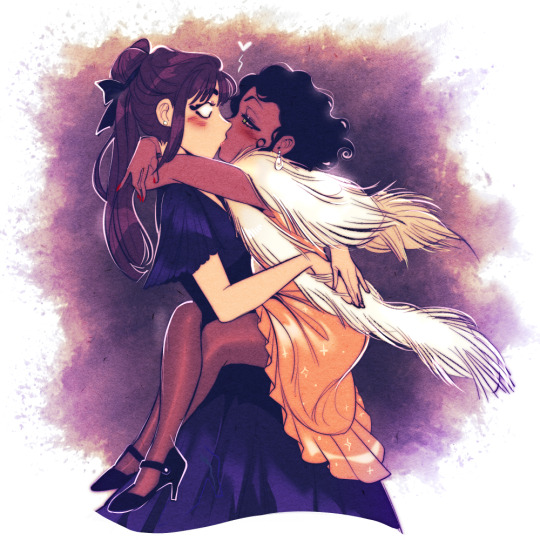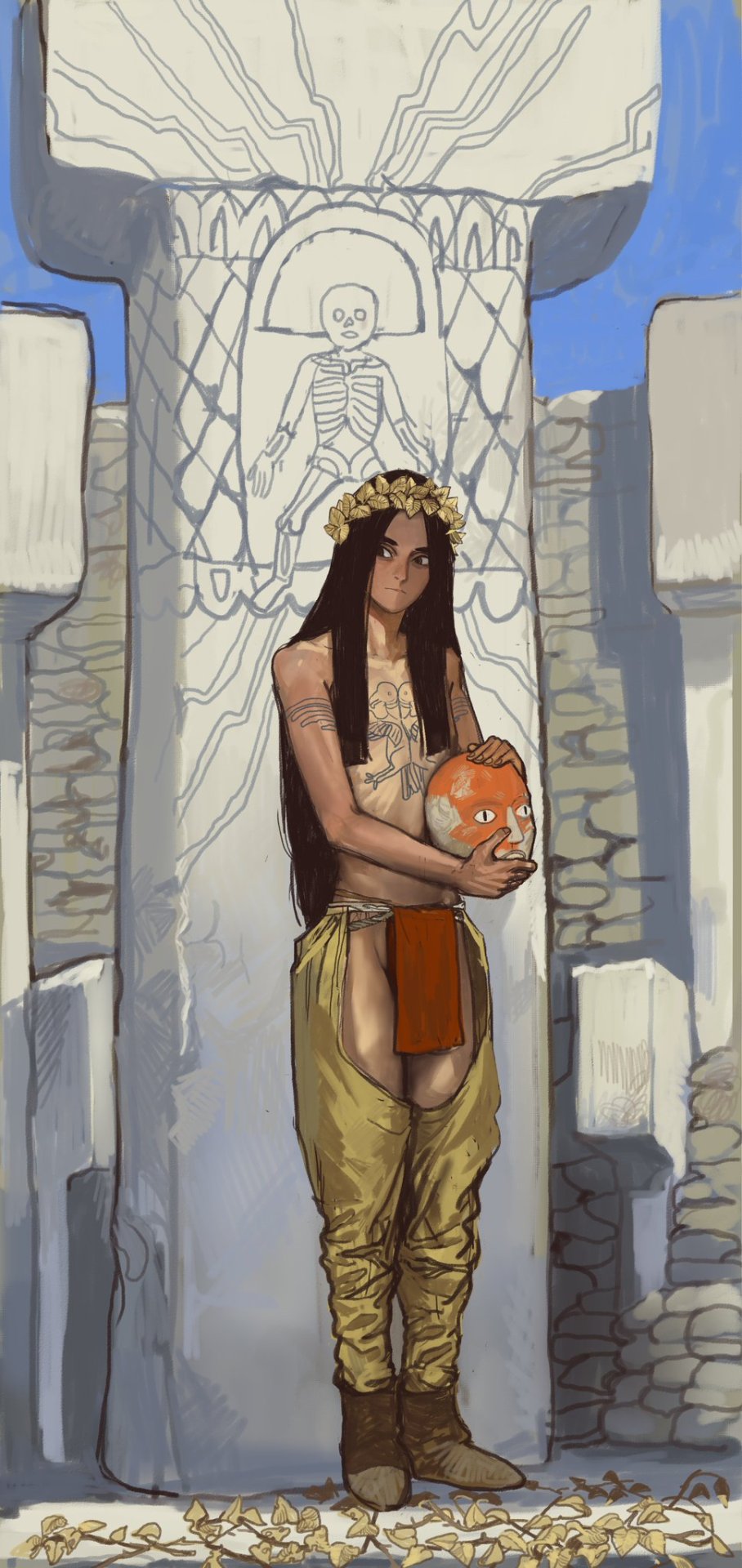Text
FUCK YEAH LETS GOOOOOOO LAAADIES WOOOOOO!!!!!!!!

Happy New Year, darlings! 🍾
Another year, and another New Year's kiss as determined by our patrons. We give them the chance to democratically nominate and elect a ship, and for 2025 they picked Eulabee. ~
933 notes
·
View notes
Text
There’s also a large grey area between an Offensive Stereotype and “thing that can be misconstrued as a stereotype if one uses a particularly reductive lens of interpretation that the text itself is not endorsing”, and while I believe that creators should hold some level of responsibility to look out for potential unfortunate optics on their work, intentional or not, I also do think that placing the entire onus of trying to anticipate every single bad angle someone somewhere might take when reading the text upon the shoulders of the writers – instead of giving in that there should be also a level of responsibility on the part of the audience not to project whatever biases they might carry onto the text – is the kind of thing that will only end up reducing the range of stories that can be told about marginalized people.
A japanese-american Beth Harmon would be pidgeonholed as another nerdy asian stock character. Baby Driver with a black lead would be accused of perpetuating stereotypes about black youth and crime. Phantom Of The Opera with a female Phantom would be accused of playing into the predatory lesbian stereotype. Romeo & Juliet with a gay couple would be accused of pulling the bury your gays trope – and no, you can’t just rewrite it into having a happy ending, the final tragedy of the tale is the rock onto which the entire central thesis statement of the play stands on. Remove that one element and you change the whole point of the story from a “look at what senseless hatred does to our youth” cautionary tale to a “love conquers all” inspiration piece, and it may not be the story the author wants to tell.
Sometimes, in order for a given story to function (and keep in mind, by function I don’t mean just logistically, but also thematically) it is necessary that your protagonist has specific personality traits that will play out in significant ways in the story. Or that they come from a specific background that will be an important element to the narrative. Or that they go through a particular experience that will consist on crucial plot point. All those narrative tools and building blocks are considered to be completely harmless and neutral when telling stories about straight/white people but, when applied to marginalized characters, it can be difficult to navigate them as, depending on the type of story you might want to tell, you may be steering dangerously close to falling into Unfortunate Implications™. And trying to find alternatives as to avoid falling into potentially iffy subtext is not always easy, as, depending on how central the “problematic” element to your plot, it could alter the very foundation of the story you’re trying to tell beyond recognition. See the point above about Romeo & Juliet.
Like, I once saw a woman a gringa obviously accuse the movie Knives Out of racism because the one latina character in the otherwise consistently white and wealthy cast is the nurse, when everyone who watched the movie with their eyes and not their ass can see that the entire tension of the plot hinges upon not only the power imbalance between Martha and the Thrombeys, but also on her isolation as the one latina immigrant navigating a world of white rich people. I’ve seen people paint Rosa Diaz as an example of the Hothead Latina stereotype, when Rosa was originally written as a white woman (named Megan) and only turned latina later when Stephanie Beatriz was cast – and it’s not like they could write out Rosa’s anger issues to avoid bad optics when it is such a defining trait of her character. I’ve seen people say Mulholland Drive is a lesbophobic movie when its story couldn’t even exist in first place if the fatally toxic lesbian relationship that moves the plot was healthy, or if it was straight.
That’s not to say we can’t ever question the larger patterns in stories about certain demographics, or not draw lines between artistic liberty and social responsibility, and much less that I know where such lines should be drawn. I made this post precisely to raise a discussion, not to silence people. But one thing I think it’s important to keep in mind in such discussions is that stereotypes, after all, are all about oversimplification. It is more productive, I believe, to evaluate the quality of the representation in any given piece of fiction by looking first into how much its minority characters are a) deep, complex, well-rounded, b) treated with care by the narrative, with plenty of focus and insight into their inner life, and c) a character in their own right that can carry their own storyline and doesn’t just exist to prop up other character’s stories. And only then, yes, look into their particular characterization, but without ever overlooking aspects such as the context and how nuanced such characterization is handled. Much like we’ve moved on from the simplistic mindset that a good female character is necessarily one that punches good otherwise she’s useless, I really do believe that it is time for us to move on from the the idea that there’s a one-size-fits-all model of good representation and start looking into the core of representation issues (meaning: how painfully flat it is, not to mention scarce) rather than the window dressing.
I know I am starting to sound like a broken record here, but it feels that being a latina author writing about latine characters is a losing game, when there’s extra pressure on minority authors to avoid ~problematic~ optics in their work on the basis of the “you should know better” argument. And this “lower common denominator” approach to representation, that bars people from exploring otherwise interesting and meaningful concepts in stories because the most narrow minded people in the audience will get their biases confirmed, in many ways, sounds like a new form of respectability politics. Why, if it was gringos that created and imposed those stereotypes onto my ethnicity, why it should be my responsibility as a latina creator to dispel such stereotypes by curbing my artistic expression? Instead of asking of them to take responsibility for the lenses and biases they bring onto the text? Why is it too much to ask from people to wrap their minds about the ridiculously basic concept that no story they consume about a marginalized person should be taken as a blanket representation of their entire community?
It’s ridiculous. Gringos at some point came up with the idea that latinos are all naturally inclined to crime, so now I, a latina who loves heist movies, can’t write a latino character who’s a cool car thief. Gentiles created antisemitic propaganda claiming that the jews are all blood drinking monsters, so now jewish authors who love vampires can’t write jewish vampires. Straights made up the idea that lesbian relationships tend to be unhealthy, so now sapphics who are into Brontë-ish gothic romance don’t get to read this type of story with lesbian protagonists. I want to scream.
And at the end of the day it all boils down to how people see marginalized characters as Representation™ first and narrative tools created to tell good stories later, if at all. White/straight characters get to be evaluated on how entertaining and tridimensional they are, whereas minority characters get to be evaluated on how well they’d fit into an after school special. Fuck this shit.
68K notes
·
View notes
Text

The Master of Mankind, c. 8000 BCE, Anatolia
Art by mossacannibalis on Twitter
678 notes
·
View notes
Text

By Roberto Ferri
19K notes
·
View notes
Text
So, yesterday I saw Vladimir Serov's "Worker". And after that I couldn't stop thinking
"Oh, Fulgrim on Chemos"
So I made redraw:)

172 notes
·
View notes
Text

Koritan, when he was still the captain of Astral Claw 2nd Company…. Some two hundreds years ago before the entire ordeal of Badab war and ending up as a blackshield Chaplain under a different name
68 notes
·
View notes
Text

at least we’re together forever
275 notes
·
View notes
Photo

‘Scissors,’ Richard Diebenkorn, 1959.
1K notes
·
View notes
Text
Archaic Words: Hate

for your next poem/story
Bydryven - to commit evil
Deule - the devil
Deviltry - anything unlucky, offensive, hurtful, or hateful
Exheridate - to disinherit; to hate or detest
Eye bite - to bewitch an animal with the evil eye
Hain - malice; hatred
Hateredyne - hatred
Hatien - to hate
Hatous - hateful
Hatrex - hatred
Hazeney - to foretell evil
Hellhound - a wicked fellow
Hiessen - to forebode evil
Ivele - evil; injury; sickness
Lathe - hateful; also: injury, harm
Lether - vile; hateful
Limbo - hell; properly, the limbus or place where the righteous were supposed to have been confined before the coming of Christ
Lothe - perverse; hateful
Mysbreyde - evil birth
Onde - zeal; envy; malice; hatred
Pelsey - mischievous; evil; wicked
Quad - bad; evil
Quede - harm; evil
Quince - the king's evil
Slier - to look sly upon, but with some evil design
Spurn - an evil spirit
Toady - hateful; beastly
Tutivillus - an old name for a celebrated demon, who is said to have collected all the fragments of words which the priests had skipped over or mutilated in the performance of the service, and carried them to hell
Ungode - bad; evil
Yeffell - evil
Source ⚜ More: Writing Notes & References ⚜ Word Lists
3K notes
·
View notes
Text

A normal dog.
260 notes
·
View notes
Text



🕷️Golden Boy (1995)🕷️
277 notes
·
View notes
Photo


Ball Temple by Edward Barons
696 notes
·
View notes
Text
A princess is imprisoned in an abandoned tower that once belonged to a wizard. The princess spends years slowly learning the art of wizardry from the scraps of arcane lore the wizard left behind, until finally becoming powerful enough to escape from her tower and take revenge upon her captors.
9K notes
·
View notes
Text

Archfey Warlock for D&D 2024 Player's Handbook.
AD: Emi Tanji
5K notes
·
View notes
Text


Soft snow ❄
Tip jar | Wallpapers | Prints | Twitter | Bluesky
4K notes
·
View notes
Text


10K notes
·
View notes
